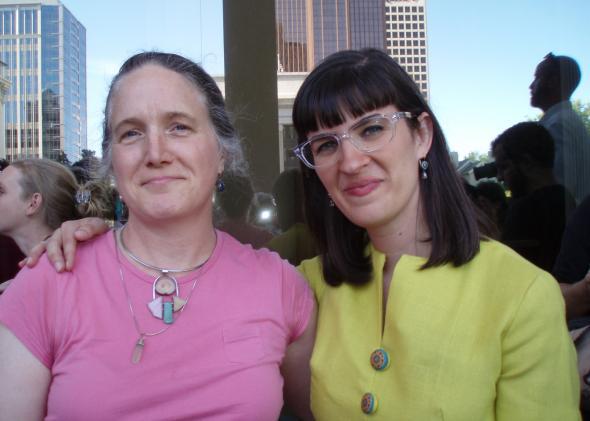In 2010, Mormon writer Kathryn Soper identified the “core conflict” of Mormon feminism, writing, “By definition, feminists challenge male authority; and by definition, Mormons defer to it.” A few years later, my friend and human rights lawyer Kate Kelly began to challenge the men, which is why, today, Kelly was excommunicated by the Mormon Church.
Kelly is the founder of Ordain Women, a group asking Mormon church leaders to take the matter of women’s ordination, which the church does not allow, “to the Lord in prayer,” much as President Spencer Kimball did in 1978 regarding the ordination of black men, who, prior to that, couldn’t hold the priesthood or enter LDS temples. Kelly was tried for apostasy in absentia by a three-man panel in her old congregation in Virginia (she currently lives in Utah) and has now been kicked out of the church she has been active in all her life.
When Kelly called me early in 2013, I was thrilled to support Ordain Women. Sure, I’d stopped going to church a couple of decades earlier. But Mormonism is a part of my identity I can’t shake. In fundamental ways, it made me.
I’ve been a Mormon feminist since high school. I could never pretend that the male-domination in the church was anything but sexism. I saw my mother, the fiercest woman I’ve ever met, chastised and humiliated for asking for greater equality in our tiny Mormon community in southern Arizona. I served a mission for the church in the mid 1980s at the Missionary Training Center in Provo, where I learned Mandarin for nine weeks before being sent to Taiwan, the male missionaries thought it was funny to call me “Sister Reddy,” after Helen Reddy of “I Am Woman” fame, because my politics were so obvious.
My mission was brutally difficult. I was a very dutiful person, so I worked hard despite my doubts, which were legion. I felt bad about trying to convert perfectly happy Buddhists and Taoists to another religion—it seemed a shame to make people more uniform, instead of celebrating what made us unique. I resented the fact that I could never baptize the people I converted, that male missionaries got that privilege. And I anguished over the arbitrariness of the rules.
Although women were able to bless the sick in the early days of the church, and still perform a very few sacred ordinances in the temple even today, women have never been ordained to the priesthood, which is why “the priesthood” is so often used as a synonym for men, as in “the priesthood will set up chairs for the Christmas party.” Women, who are subject to the oversight of men in anything church-related, are allowed to manage a few organizations for girls, which Apostle Dallin H. Oaks recently called “appendages.” But mostly women are expected to focus on motherhood—their highest calling—and leave governance of the church to “the priesthood,” which boys can receive at age 12.
This bans women from all but a handful of major leadership positions. More importantly, the priesthood isn’t merely an administrative system for church governance: It’s also the mystical power through which human beings are authorized to know and enact God’s will. Women are expected to forgo the blessings of ministering to their fellow human beings because of their uteruses. Kelly didn’t start Ordain Women simply to shake up the system or because she wanted power in the church; she did it because she wants to know and enact God’s will too.
Kelly is by no means the first Mormon feminist publicly punished by the church’s male leadership. Among the more famous of Kelly’s predecessors is Sonia Johnson, excommunicated in 1979 for opposing the church’s aggressive efforts to defeat the Equal Rights Amendment. In 1993, my friend Janice Allred was excommunicated for discussing women’s ordination and the role of gender in Mormon theology. But Kelly’s trial is more high-profile than either of those cases, because there is one thing the Church can’t ban: the Internet. Kelly’s website for Ordain Women drew people to her cause, outraged male leaders, and is what put her in the news today.
I attended a vigil to support Kelly on Sunday night in Salt Lake City, where I stood in a park near the church-owned Temple Square with several hundred other Mormons who believe women and men both deserve true equality. Michael Ferguson and Seth Anderson, the first gay couple to get married in Utah, stood on either side of me. My friend Stephanie Lauritzen, who created “Wear Pants to Church Day” in 2012, a modest direct action that resulted in death threats (yes, suggesting that Mormon women wear pants to church can make people want to kill you) was there, as was Allred. Not present was Allred’s sister Margaret Toscano, who was excommunicated for her feminist activism in 2000, but she has been part of other Ordain Women events.
Kelly told us all the story of how, as a missionary in Spain, she was called to serve as a leader in the local congregation. Before she could even respond, male missionaries burst into the room and announced that it was a practical joke. Just one humiliation in a long line of them.
I admit I suspected from that first phone call from Kelly that she might someday face disciplinary action from the church for standing up for women. I just didn’t think it would be so soon.
